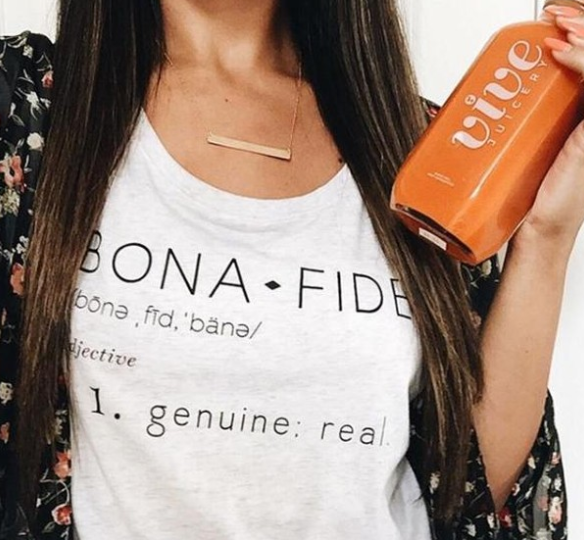Have you ever held a bottle of juice, and someone has questioned the health benefits? Did the situation leave you feeling uneasy? Don't worry - we've had countless questions and people challenging how juice does or doesn't correlate to wellness.
The good news? We've done the research, we've been in it, and we're here to bring clarity to the questions, myths, and other misconceptions. Follow along so you can sip easy (or throw it back!), knowing the truths behind cold-pressed juicing!
Myth #1:
Cleansing is bad for you.
Myths around cleansing can show themselves in different question formats, but they all allude to one thing: the thought that juice cleansing does more harm than good.
Unpacking this myth stems from the root of it all: fad diets. If you're looking to lose weight fast, a juice detox is not right for you. A juice fast is complimenting our body's natural ability to detox! That's what our liver, kidneys and other elimination and detoxification organs are for. Our body has everything it needs to rid itself of toxins. A juice fast is simply there to aid in the process!
In today's highly processed and inflammatory diets, it can be hard for our bodies to keep up. A juice fast is a one to five-day detox of bioavailable produce. That means your body can absorb the nutrients with little to no effort. With the absence of dietary missteps (we all do it!), a cleanse paves a path for digestive healing. Cleansing is a valuable resetting and mindfulness tool, but it's not for weight loss or long durations of time.
Myth #2:
Juice Has Too Much Sugar
There's a common misconception that fruit sugar is just as harmful as processed sugar. There is a big difference in eating or drinking whole fruits as opposed to having a candy bar. When consuming fruit, it is almost impossible to consume enough fructose for it to be harmful. If you find yourself reaching for all fruit juices, even the natural sugar (while not comparable quality-wise) is similar to the amount found in candy bars and sodas. You'll feel the difference between the sugars because with processed and refined sugars, you will notice headaches, fatigue, and energy crashes. Natural sugar from fruit can help facilitate a natural energy boost without the crash.
Now, this is depending on the juice you reach for, but supplying your juice tooth from a brand that makes their own juice (opposed to sourcing or 'wholesaling' from others) can mend any worry about the product quality. For example, here at Vive, we are a veggie-forward company. Our bottles don't have any more than one whole fruit per bottle. We do this to stay mindful of sugar intake.
We encourage you to be intentional with the flavors you choose or do some research into the juice company you buy from to find out their stance on sugar! Talk to your juice co about the fruit amount or reach for recipes that are veggies first and you can feel good about the natural ingredients you are receiving!
There's a common misconception that fruit sugar is just as harmful as processed sugar. There is a big difference in eating or drinking whole fruits as opposed to having a candy bar.
Myth #3:
Juice from the Grocery Store is the Same as Your Local Juice Bar's
The easiest way to bust this myth is as simple as reading your labels! Or better yet, look for anything that mentions processing, pasteurization, or is bottled in plastic. Plastic bottles are an immediate clue that the product has been processed in some way to extend shelf life!
What's the difference between your natural grocers and your local juice bar? The local juice bar is juicing their own product and is selling on a straight to consumer basis. Selling straight from the source allows for the juice co. to keep the nutrients ALIVE and RAW!
Even your natural grocery shop can say they are offering their own cold-pressed juice. However, for a larger scale business such as grocery stores, they typically have their own production facility that is not the specific location you are shopping at. To create the product at high volume with a shelf life that benefits profit for these companies, the juice will be processed to extend the raw juice shelf life from 3-7 days to about six weeks. If the juice is bottled in plastic, has a shelf life longer than a week when you check it out or has any letters like 'HPP', this juice is not fresh.
Here's how we look at it... if you wouldn't eat a six week old salad, you shouldn't be drinking a six week old juice.
Myth #4:
Bottling in Glass is
Worse for the Environment
This myth stems from the fact that it does take more time and resources to make glass. However, glass can be endlessly reused and recycled. For scale, only about 9% of plastic actually gets recycled. When glass is recycled, it never loses its quality or purity. Unless you break it, but in that case, it can be melted back into a new glass, which then can continue the life span of glass.
When plastic is recycled and reused, it can only be down-cycled, which means it can only be processed into something of lesser quality.
The truth of it all? Glass and plastic both have pros and cons to recycling. The main answer to this problem is to reduce our one-time product use! If you find yourself throwing a bottle in your recycling bin see if there's something you can do to reuse that item!
Here at Vive, we offer credit to get our glass bottles recycled back to us where we can reuse them. Your bottle of juice has the potential to have been in rotation for six years! (cleaned, sanitized, and repeated of course)
Myth #5:
There is No Fiber in Juice
The juice is not going to be your go-to if you're looking for fiber, that is TRUE! However, not all fiber is lost in juicing. When you use the entire produce (skin and all!), you will find amounts of soluble fiber. What does this mean? It's the fiber that your body CAN breakdown! Soluble fiber can help feed your gut! #GutHealth2020 It helps the good bacteria thrive longer. Since this type of fiber doesn't hold back absorption, you are able to absorb 100% of the juice's nutrients!
Because of the absence of insoluble fiber, (the fiber that doesn't break down), this is why juice can hold 3-5lbs of produce per bottle! Because that fiber isn't weighing it down or taking more space. Insoluble fiber is good in a high processes, high sugar diet to help combat your body from absorbing those things. When pairing juice with a whole food diet, you'll get more than enough fiber to keep things 'moving'.

